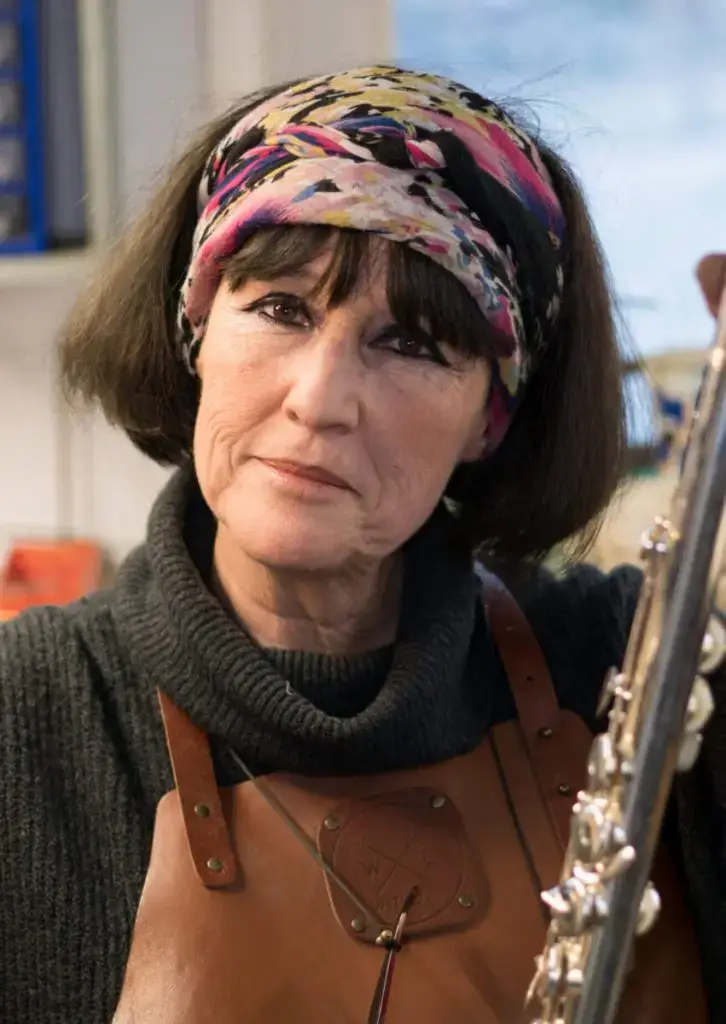
Happy Birthday to Eva Kingma, b. 1956
Eva Kingma, a pioneering flutemaker renowned for her innovative developments in low flutes and influential collaborations with leading musicians worldwide.
Early Life and Influences
Born on May 15, 1956, into a family rich in artistic talent, Eva Kingma’s path to becoming a renowned flutemaker seemed almost destined. Her father was a sculptor, and her mother was a professional classical pianist and singer. This creative environment nurtured her early interest in music and craftsmanship.
From the tender age of two, Kingma was allowed to play with tools in her father’s workshop. Her initial musical passion was for the recorder, inspired by the concerts of Frans Brüggen. She saved all her pocket money to buy his records, immersing herself in the music. However, her interest gradually shifted towards the wooden flute, a transition influenced by her great uncle, Dirk Kuiper, who was the second flutist in the Concertgebouw Orchestra and a flutemaker.
The Genesis of a Flutemaking Career
Kingma’s fascination with flutes deepened during family visits to her great uncle’s workshop. Although initially hesitant to ask for a tour, her curiosity eventually led her to experiment with the mechanics of her own flute, even breaking it in the process. This mishap marked the beginning of her flutemaking journey when she called Kuiper for a repair.
Impressed by her enthusiasm, Kuiper hired her on October 8, 1975. Kingma quickly progressed from producing silver-plated student flutes, known as Kuiperflutes, to crafting silver flutes, alto flutes, and white gold C flutes. Her hands-on experience and keen interest in the technical aspects of flutemaking laid a solid foundation for her future innovations.
Innovations and Taking Over the Kuiper Shop
In 1981, Kingma took over the Kuiper shop, marking a significant milestone in her career. The mid-1980s saw Dutch flutist Jos Zwaanenburg requesting an open-hole alto flute, an unusual instrument at the time. This project marked the beginning of a revolution in flutemaking. In 1987, Kingma and her uncle developed an open-hole bass flute, launching the now-famous Kingma System. She received a U.S. patent for this system and showcased it to Robert Dick, who immediately ordered a second prototype and premiered it in Amsterdam.
Expanding Horizons and Key Collaborations
Kingma’s passion for low flutes deepened towards the end of the 1980s, prompting her to move her shop to the north of Holland and specialize in this area. She collaborated with the pioneering flutemaker Albert Cooper on scales and headjoints, leading to the development of bass, contr’alto in G, contra, and subcontra flutes.
In 1989, Kingma visited notable flutemakers like Wm. S. Haynes and Verne Q. Powell and met Dana Sheridan and Bick Brannen. Her meeting with Brannen proved to be a pivotal moment in her career. They met again in 1992 at Cooper’s 70th birthday and started collaborating in 1993. This partnership led to the launch of the Brannen Kingma System C flute, introduced at the 1994 NFA Convention by Kate Lukas and Anne La Berge. Subsequent projects included the first full Kingma System alto flute in 2014 and the Kingma and Brannen bass flute in 2015.
Continued Innovations and Legacy
For the past 25 years, Kingma has worked intensely with Swiss flutist Matthias Ziegler, designing special flutes like the Hoover. In 2015, she and Ziegler launched a flute festival in Grolloo, her hometown in Holland, featuring performances by Wissam Boustany and Ian Clarke.
In 2007, Kingma began collaborating with the Sankyo Company on the Kingma System, and more recently, Boston flutemaker Lev Levit has begun producing her flutes. Silversmith David Kerkhof joined Kingma’s shop in the early 2000s, further enhancing the craftsmanship of her instruments.
Kingma’s flutes are played by many renowned musicians, including Emmanuel Pahud, Wissam Boustany, Jos Zwaanenburg, Anne La Berge, Dave Weiss, Henri Threadgill, Sir James Galway, and Helen Bledsoe. Her instruments are also used by radio orchestras in Holland, flute choirs, Hollywood studios, and the Concertgebouw Orchestra in Amsterdam.
Eva Kingma’s journey from an early fascination with flutes to becoming a pioneering flutemaker is marked by significant collaborations and innovative developments in the field of low flutes. Her work has left an indelible mark on the world of flute music, and her legacy continues to inspire flutists and flutemakers worldwide.
This event has passed.
Happy Birthday to Eva Kingma

